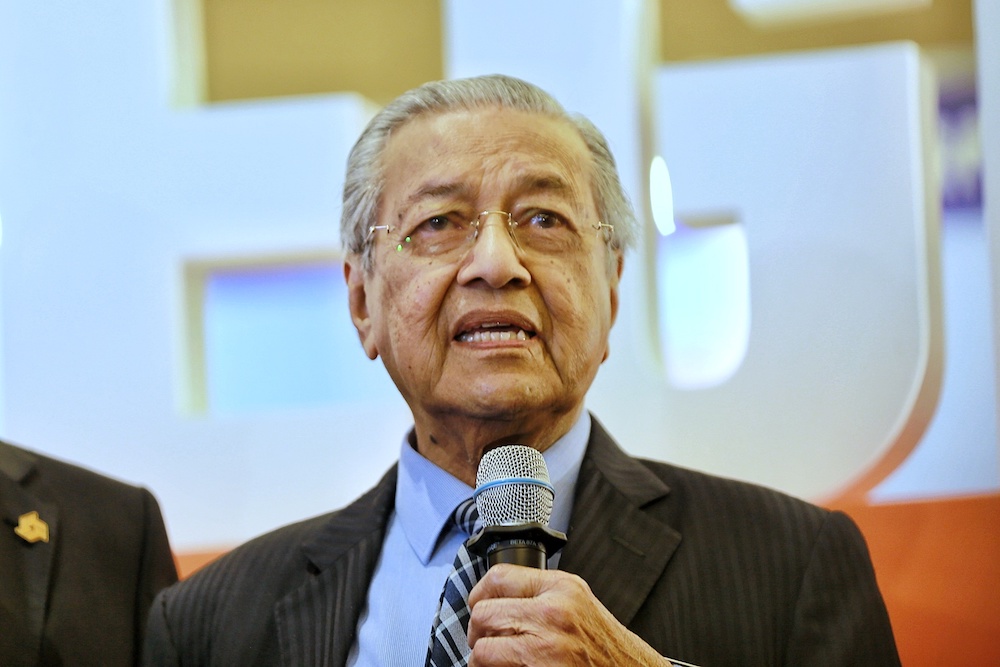KUALA LUMPUR, Feb 3 — The decision by Prime Minister Tun Dr Mahathir Mohamad to bring back English as the instructing medium for Science and Mathematics in schools has been well-received by a parent group and educators.
However, both said they are hoping that the decision will not end up being politicised again.
Melaka Action Group for Parents in Education (Magpie) chairman Mak Chee Kin said the announcement by Dr Mahathir was a ‘move long overdue’.
“Magpie was confident that with the return of Dr Mahathir as the Education Minister, English in science, technology, engineering, and mathematics (STEM) subjects will be reintroduced,” he told Malay Mail.
Mak said Dr Mahathir is putting back in place what is appropriate for Malaysia’s children and future generations, despite risking political unpopularity with the move.
“The demise of the English for Science and Mathematics policy was politically pressured and has nothing to do with student, parent or mother tongue, though some teachers were not up to the mark.
“Every parent knows the importance of English but they were at mercy of irresponsible politicians. Magpie hopes that all parties will accept this policy now for the good of our children,” he said.
The chairman added that those who feel otherwise should give their ideas and input to ensure the policy’s success, rather than taking to the streets to protest the new policy.
“The success of its implementation simply means the success of our children in mastering STEM subjects in English, which will enable our children to compete globally,” Mak said.
He said the first step must be to encourage more schools to adopt the Dual Language Programme, which Mak stressed will be imperative to solve all shortcomings before going full-swing.
“Resources like manpower and materials must be in place. Proficient STEM English educators who have retired should be engaged in order to temporarily fill the gap of teacher shortage problem which is likely to arise.
“Tun Dr Mahathir will also have to find ways to make the policy irreversible, perhaps by making it black and white, or legislating a sub by-law, to prevent future ministers from attempting to undo it.
“I also believed once Tun puts in place a strong reliable team in the ministry, such as the present Education director-general Dr Habibah Abdul Rahim, this policy will continue to remain strong and will become a success,” he said.
Educationist Sharifah Munirah Alatas said: “My only worry is that it will be hijacked somewhere along the transition period, by nationalists who oppose anything that is regarded as a threat to Malays. The problem is that our mindset is still stuck in separate identities — Malay, Chinese, Indian, Iban, and so forth,” she said.
The pro-moderation group G25 member considers the policy as a positive step as it will unite all races in the country under the notion of being Malaysian.
“This switch to English must be holistic, and needs to address other potential problems including the lack of trained teachers with English competency, insufficient English-language textbooks for Maths and Science subjects, and encouraging other educators such as academics in higher education institutions and universities to participate,” she said.
Sharifah also highlighted potential difficulties that could arise in implementing the policy.
“We need to speak of and write about how learning Maths and Science in English is not an insult to what it means to be Malay, Chinese, Indian, and so on. We must emphasize that learning Maths and Science in English can enhance national unity rather than divide the different races.
“Academics and other educators must participate alongside the parent-teacher groups to expose the narrative that English in schools and universities will not erode the Malaysian identity,” she said.
Sharifah pointed out that the causes of why the policy first failed over a decade ago, should be revisited and addressed, in order for there to be no more backtracking.
“We must not repeat mistakes. I hope the government will stick to this policy. We have already made the mistake of abandoning English for Science and Maths, and we Malaysians have paid the price economically.
“It is also important to be mindful of the nationalists who will do anything to politicise the prime minister’s policy change. All quarters of Malaysian society have to view all potential problems, and address them simultaneously,” she said, adding that this is the only way to move forward.
“Problems may also arise when troublemakers associate English language with undermining Islam, as we have encountered similar problems in the past. Such examples include misconceptions about whether to use the word Allah, Tuhan, or God.
“These misconceptions are all about confusion between language, culture, ethnic identity and religious identity. A clear distinction has to be made between all these and the economic health of our nation, thus there is a need to stress the compatibility, not its divisiveness,” she said.



















